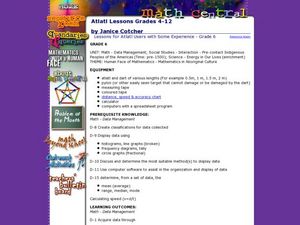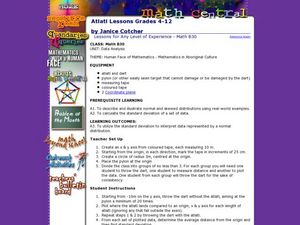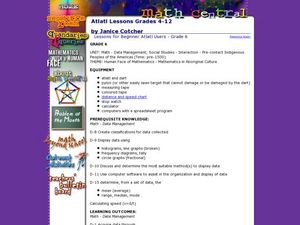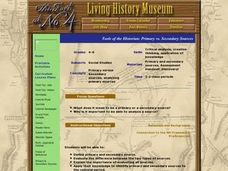Curated OER
Circular "Mandala"
Students create a nonobjective design from a magazine photo (or personal photograph) using a view finder. By using colored pencils the drawing use layers to recreate the colors in the magazine picture.
Curated OER
Social Studies: Great Circle Route
Young scholars compare routes between Minnesota and China using a map and globe. Using the "great circle route" method, students find the shortest route between two points.
Curated OER
Op Art Circles
High schoolers create Optical Art, art that seems to move when you look at it, in this Art lesson for the High School classroom. Included with the lesson is a list of recommended materials and suggested resource books for lesson...
Curated OER
Why All Maps Lie
Eighth graders discover the fundamental advantages/disadvantages of both maps and globes. They see that maps may distort size, shape, distance and direction. They discuss the advantages and applications of 5 types of map projections and...
Exploratorium
Soda Can Mirrors
Here is an entertaining and illuminating lesson on morphed images. Middle schoolers make cylindrical mirrors by wrapping soda cans in reflective mylar. First, they try to determine what the images are that are embedded in the plan by...
Curated OER
Amazing Triangles
Student scientists investigate triangle structures. In this building lesson plan, students explore how to design triangle braces in the construction of structures in order to build a stronger base.
Curated OER
Lessons for Atlatl Users with Some Experience-Grade 5
Fifth graders throw darts, collecting data for distance traveled. For this data analysis lesson, 5th graders throw a dart using an atlatl. They calculate the speed for each throw and determine the best dart length for distance throws.
Curated OER
Lessons for Atlatl Users with Some Experience-Grade 6
Sixth graders experiment with an atlatl and dart. In this sixth grade data management mathematics lesson plan, 6th graders explore and determine the most suitable methods of displaying data collected from their experimentation with...
Curated OER
Human Face of Mathematics - Mathematics in Aboriginal Culture
Students collect statistical data. In groups, students play a dart game and then determine the distance between darts. They collect the data and plot the information on a coordinate plane. They identify the mean and the...
Curated OER
Atlatl Lessons Grades 4-12: Lesson for Beginning Users of Atlatl
Sixth graders determine the mean, range median and mode of a set of numbers and display them. In this data instructional activity students form a set of data and use computer spreadsheet to display the information. They extend of...
Curated OER
Test Yourself for Hidden Bias
Students examine their own hidden bias. In this diversity lesson, students link to an Internet website to test their own stereotypes and prejudices. Students discuss how bias is perpetuated in society and determine what they can to about...
Curated OER
Matching the Globe with the Map
Learners examine how to use a globe. In this globe and map comparison lesson, students discuss how the globe and map are alike when looking at Africa and Antarctica. Learners investigate shapes and sizes of globes versus maps.
Curated OER
Tools of the Historian: Primary vs. Secondary Sources
Students identify the difference between primary and secondary sources. They discuss the importance of evaluating all sources they might use. They read primary and secondary sources that relate to the colonial period.
Curated OER
Four Main Directions
Students describe directions using a globe for north, east, south and west. In this mapping lesson plan students identify the north and south pole. Students understand the importance of the equator and the Prime Meridian. Students...
Curated OER
World Map and Globe - Four Main Directions
Students study the four main directions on a map. In this map lesson, students locate the North and South pole, and learn the four cardinal directions. They use the compass rose on a map to help with the directions. (Map is not included...














